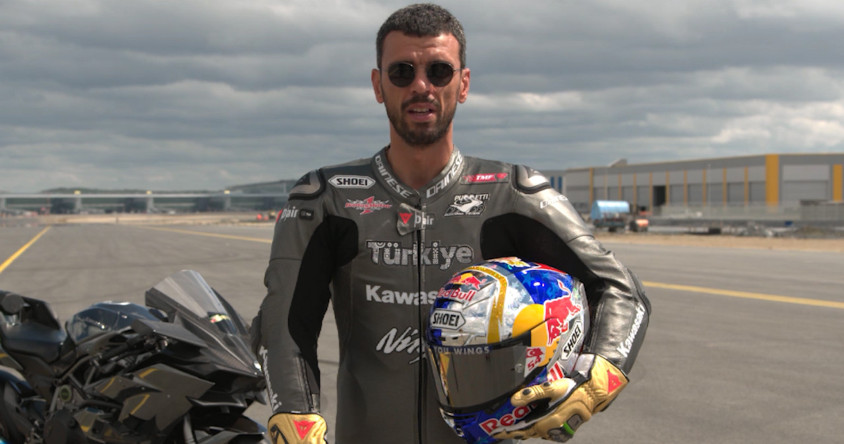Rising In the East
A personal take on motorcycle racing today, from John Newman
John Newman
Watching bike racing is one my life pleasures. It conflicts somewhat with my thoughts on climate change and the burning of fossil fuels. But I'm as flawed as anyone else when the reckoning comes, and my BMW F800R returns exceptional miles per litre.
In concert with millions of other fans since the plague has been upon us, my enthusiasm has been sated by a diet of TV coverage of Moto GP, World Superbike (WSB) and British Superbike (BSB). With wistful memories of attending my last race meetings in person, at warm and sunny Aragon in Spain.
I don't follow all the news, gossip and rumours, which abound across motorcycle media in print or social and anti-social media. As long as I catch up with who is racing what and in what team near the beginning of the season, I'm content.
Talking Turkey
A number of years ago a rider began appearing on the grid in the World Supersport class at WSB, whose name was different enough from the regular and recognisable European riders to grab my attention. His name was Kenan Sofuoglu, from Turkey.
Sofuoglu had started and become a champion in Turkey before heading for Europe and subsequent success in the German Yamaha R6 Championship, and the European Superstock, before entering World Supersport and garnering five world titles between 2007 and 2016. (For a spell in 2013 as world champion, he joined the Indian racing team Mahi racing. Set up by the Indian cricket star Mahendra Singh Dhoni.)
Now other riders from Turkey are racing their way to fans' attention. Can Oncu rode in the Moto 3 category of Moto GP last year, following a successful few years in the European and Asian series for young riders; alongside his brother Deniz. This year Can has progressed to World Supersport like his backer and mentor, the aforementioned Kenan Sofuoglu.
Toprak Razgatlioglu, as well as testing anglo commentators pronunciation, has been at the front of the field throughout the 2020 World Superbike programme aboard a Yamaha R6 sponsored by long time WSB supporters Pata the Italian potato chip company.
Race To The Top
Motorcycle design and manufacturing was seen as the preserve of British and European countries and companies, until Japanese industry in the period of reconstruction following the Second World War began to build (very good) motorcycles, and then used racing to improve the breed.
Japan also provided the racing scene with a clutch of talented racers, and because their entry onto the grids was seen as synonymous with the bikes they rode, it was not considered a phenomenon. But racers from what have been considered in recent economic history to be 'developing' countries, are starting to come to the fore. Just as their countries have also invested in new race circuit facilities.
Qatar, Thailand, Malaysia, and Indonesia have all been sucessful in getting their circuits into the Moto GP calendar. The Asian Talent Cup, organised by Moto GP owners Dorna and sponsored by the Japanese/Norwegian oil company Idemitsu is the lead entry point for young riders (12 - 19 years) from Thailand, Malaysia, The Phillipines, Indonesia, and India. These are countries which historically have not featured or been the focus of race fans in the northern hemisphere.
Hafizh Syarhin from Malaysia became the first Southeast Asian rider to compete in Moto GP. In common with most others who compete at this level, he began racing in his own country at a very young age ( 9yrs old), and graduated through the various competitions and classes. He reached the Moto GP pinnacle in 2018 with a contract and ride with the Monster Yamaha Tech 3 team.
Malaysia is one of the countries which has prospered as the Asian regional economies have grown. The visible evidence of this as far as race fans are concerned is the involvement of their goverment owned oil and gas company Petronas. Major sponsors of Moto GP teams and Mercedes Formula One.
China is the world's most populous country, with industrial and economic development on a scale that is almost unimaginable. They are a major lightweight motorcycle manufacturing country, although this is now declining as fossil fuel driven motorcycles are banned in most large cities and urban centres.
Motorcycling Leisure And Pleasure
The exception is the south western city of Chongqing, where motorcycling as a leisure and pleasure activity is still thriving. Despite this road riding obstacle the race scene is growing, with a China Superbike Championship programme, though mainly for lightweight machines, and at the other end of the capacity scale the Ducati Panigale championship is building on the dealerships they first established in 2009. Surely just a matter of time before racers in this country turn their competitive ambitions towards the northern hemisphere race scene.
Across the whole region of Asia there's a network of circuits and championships that at the moment don't capture our attention that much. The populations of Asian countries tend to be younger people, who are the market for motorcycling and motorcycle racing. If you check out the attendees and graduates of Valentino Rossi's VR46 master camps over the last few years, most are from Thailand, Indonesia, Philippines, and Malaysia.
These young men, and a few young women, are tutored, encouraged and racing from a young age, they will only ever have ridden bikes on the track.
At a BSB meeting at Cadwell Park last year, one of the pundits observed that the sea of four wheeled vehicles in the fields far outnumbered the bikes that were there. The motorcycling paradox; thousands still interested and attending race meetings (when they can), but no longer out on the roads.
Some thoughts from John about the increasingly international world of motorcycle racing today. Any comments on his story we'd love to hear what you think on
Facebook or email us at:
[email protected]


